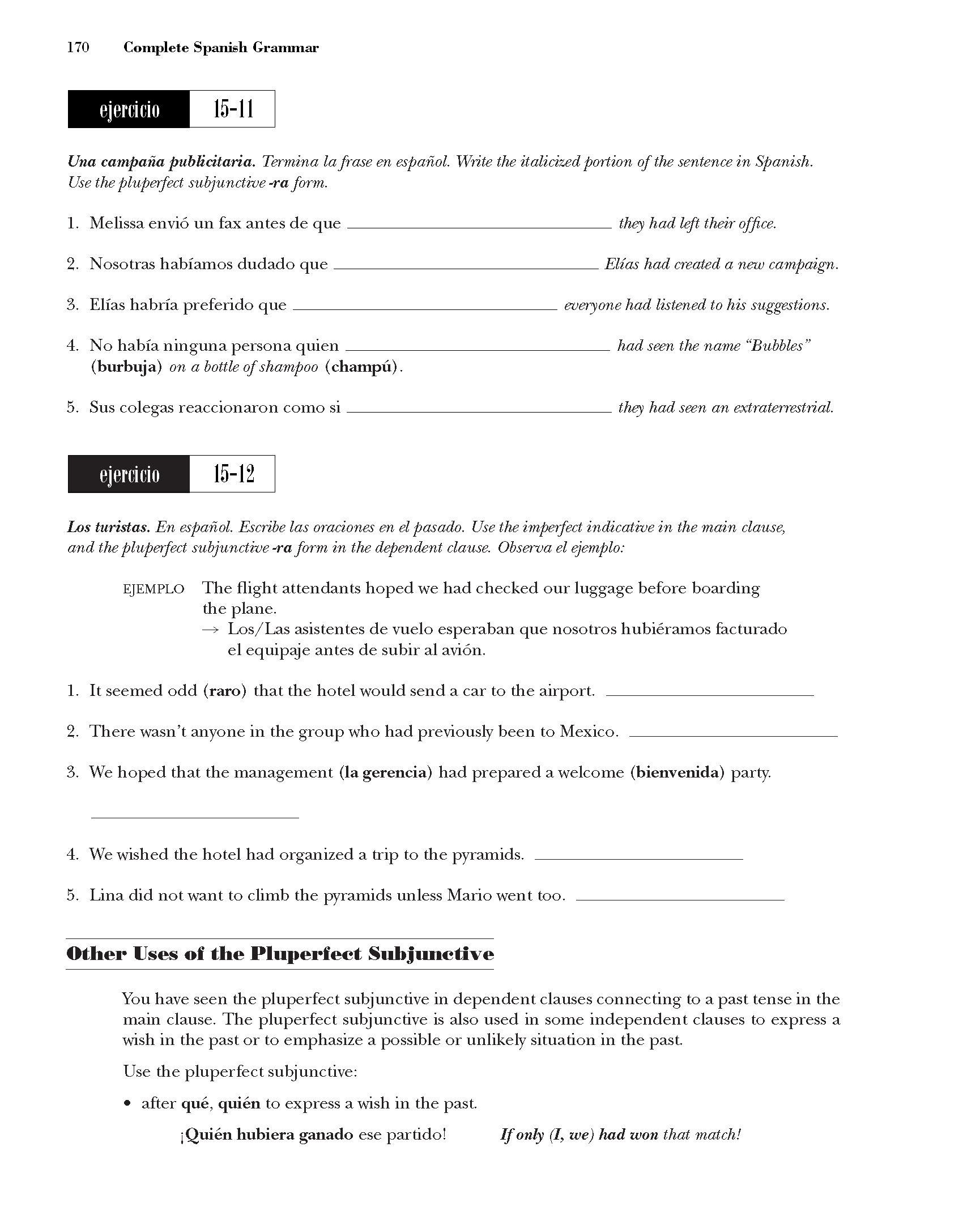CSG181

170 Complete Spanish Grammar
15-11
ejercicio
Una campańa pubUcitaria. Termina la frase en espanol. Wńte the italicized portion of the sentence in Spanish.
Use the pluperfect subjunctive -ra form.
1. Melissa envió un fax antes de que_ they had left their office.
2. Nosotras habfamos dudado que_Elias had created a new campaign.
3. Elias habrfa preferido que_eoeryone had listened to his suggestions.
4. No habfa ninguna persona quien_ had seen the name “Bubbles”
(burbuja) on a bottle ofshampoo (champu).
5. Sus colegas reaccionaron como si_they had seen an extraterrestrial.
15-12
ejercicio
Los turistas. En espanol Escribe las oraciones en el pasado. Use the imperfect indicative in the main clause, and the pluperfect subjunctive -ra form in the dependent clause. Obserua el ejemplo:
EJEMPLO The flight attendants hoped we had checked our luggage before boarding the piane.
—> Los/Las asistentes de vuelo esperaban que nosotros hubieramos facturado el equipaje antes de subir al avión.
1. It seemed odd (raro) that the hotel would send a car to the airport. _
2. There wasn’t anyone in the group who had previously been to Mexico. _
3. We hoped that the management (la gerencia) had prepared a welcome (bienvenida) party.
4. We wished the hotel had organized a trip to the pyramids. _
5. Lina did not want to climb the pyramids unless Mario went too.
Other Uses of the Pluperfect Subjimctive
You have seen the pluperfect subjunctive in dependent clauses connecting to a past tense in the main clause. The pluperfect subjunctive is also used in some independent clauses to express a wish in the past or to emphasize a possible or unlikely situation in the past.
Use the pluperfect subjunctive:
• after que, quien to express a wish in the past.
jQuien hubiera ganado ese partido! Ifonły (I, we) had won that mat eh!
Wyszukiwarka
Podobne podstrony:
CSG181 170 Complete Spanish Grammar 15-11ejercicio Una campańa pubUcitaria. Termina la frase en espa
CSG179 168 Complete Spanish Grammar 15-8ejercicio Reacciones. Escńbe la letra de la frase que conect
CSG059 48 Complete Spanish Grammarejercicio l Yerdadero o falso ? _ 1. John Glenn fue el primer homb
CSG211 200 Complete Spanish Grammar 17-10ejercicio Escribe el plural. Incluye la forma los o las del
CSG047 36 Complete Spanish Grammar On the other hand, the expressions of time ayer... a la una y med
CSG085 74 Complete Spanish Grammar 5. Si tu convences al vendedor, nosotros_ (tene
CSG169 158 Complete Spanish Grammar 6. Mi amigo busca un apartamento cerca de un campo de golf. Noso
więcej podobnych podstron